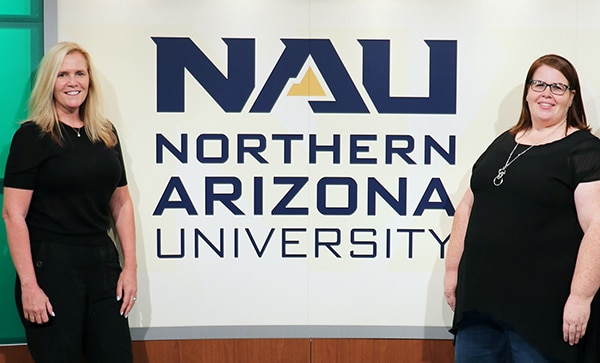Pivoting due to COVID leads to project’s success

A mere six months before the pandemic, Amy Armstrong-Heimsoth, associate clinical professor, NAU Department of Occupational Therapy, and her community partner Shevaun Sullivan, director of group home relations for OCJ Kids or Opportunity, Community and Justice for Kids, in Phoenix, received funding from the Southwest Health Equity Research Collaborative’s Community-Campus Partnership Support (CCPS) for their project.
Their plan was to create a coalition of community experts to improve services and resources for youth leaving foster care. Many foster care youth in Phoenix lack essential skills to successfully navigate life on their own.
“Overall, they don’t have good outcomes and it is no wonder,” Armstrong-Heimsoth said of youth aging out of foster care. “When we become adults, most of us have a number of mentors in our lives that we turn to for advice and life skills. Our whole lives have prepared us. Many youth leaving foster care do not have the necessary life skills or plans in finance, education, health insurance, socialization or housing to help them lead a healthy life.”
Armstrong-Heimsoth and Sullivan discovered in an earlier research project that developing a consistent transition program for foster youth was possible if organizations collaborate.
“The needs of this population of young adults are great and can sometimes seem like a brick wall that can’t be destroyed by one organization,” said Sullivan. “But the exciting part is that if we join together, the possibilities become endless on the change we can bring to this population.”
Both Armstrong-Heimsoth and Sullivan said that the partnership has been beneficial.
“Working with Amy has opened my mindset to be able to start opening doors to join with other organizations to start making greater change,” Sullivan said. “Being able to see what others are doing and find out where the gaps of service are is a great start. Not only discovering those gaps but working together to meet those needs. We all talk about it, but it is refreshing to be a part of a coalition that is willing to do something about it.”
Using the CCPS funding, Armstrong-Heimsoth and Sullivan arranged for four Phoenix organizations — OCJ Kids, Onward Hope, notMYkid, and Foster Arizona — to attend The Annual Children’s Mental Health Research and Policy Conference on Child, Adolescent, and Young Adult Behavioral Health conference in Tampa, Florida.
The conference offered an opportunity for the four organizations not only to learn from experts in the field, but also to solidify the coalition and develop a realistic plan to help foster youth in Arizona. Though the conference seemed like the ideal start to the project, the Tampa event was canceled due to the COVID-19 pandemic.
“Pre-COVID, my original plan was to have the four agencies empowered to evoke change in the community together,” Armstrong-Heimsoth said. “With COVID, it was like ‘Oh, my gosh. How are we going to spend the money meaningfully?’”
She met with Carmenlita Chief, CCPS senior research coordinator, who suggested that Armstrong-Heimsoth contact a local coach to create a leadership program rather than traveling to a conference. Armstrong-Heimsoth found Julie Lancaster of Lancaster Leadership who developed a customized curriculum that highlighted team building and consensus building for the coalition.
“Amy and Shevaun’s partnership illustrates the greatest strengths of collaboration, flexibility and adaptation to current circumstances” said Nicolette Teufel-Shone, associate director of the Center for Community Health and Engaged Research and professor in NAU’s Department of Health Sciences. “They are united in their commitment to youth. This shared passion led them to find a solution to the travel restrictions.”
In November, the coalition met for the two-day online strategic planning. They worked on strengths, weaknesses, opportunities, threats (SWOT) analysis, created strategic initiatives, signed up for tasks and created an action plan.
“These people came together and hammered out work,” Armstrong-Heimsoth said. “That usually takes groups a long time to do. We now have a transitioning group coalition that has a strong strategic plan.”
Armstrong-Heimsoth said the group will first focus on youth who have substance abuse issues, are teen parents, need immediate shelter, or have criminal records. She said that with the solid start, the coalition will continue to strengthen the foundation for all youth transitioning out of foster care in Arizona.
“There is no shortage of things that could be done in this realm,” Armstrong-Heimsoth said of youth transition out of foster care.
Armstrong said that looking back, meeting with Lancaster Leadership for a customized program was the reason the coalition galvanized so easily.
“It was so much more meaningful having had to go down a different path because of COVID,” she said. “It was the silver lining.”
For more information on Armstrong-Heimsoth and Sullivan’s partnership, please watch the CCPS video series featuring their project.
This research received funding from the Southwest Health Equity Research Collaborative at Northern Arizona University (U54MD012388), which is sponsored by the National Institute on Minority Health and Health Disparities (NIMHD).
